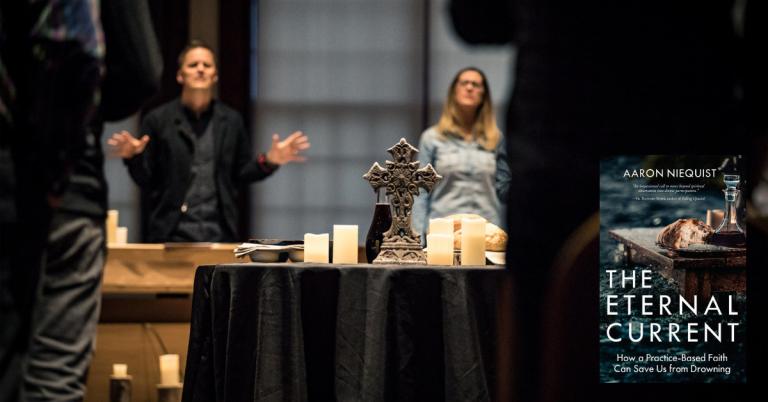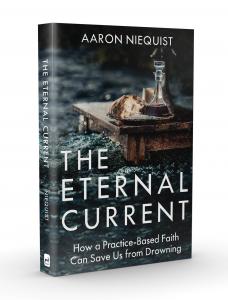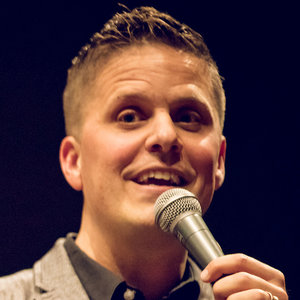
Kurt: Today I’m excited to share with you an excerpt from my friend Aaron Niequist’s brand new book: The Eternal Current: How a Practice-Based Faith Can Save Us from Drowning. I’ve been waiting a long time to get a copy in my hands. And let me tell you: this book will not disappoint.
In what follows, Aaron shares why Sunday gatherings for worship are not the main thing. It is a catalyst that propels Jesus-followers to practice the ways of Jesus throughout the week.
 And hear me: I am a huge advocate for the Sunday gathering. We’ve been doing this for 2,000 years and I don’t think we need to get rid of it.
And hear me: I am a huge advocate for the Sunday gathering. We’ve been doing this for 2,000 years and I don’t think we need to get rid of it.
However, I do think we need to consider if what we do during that hour and a half each week is equipping regular folks to practice their faith together in the day-to-day grind of life.
So, with that, here’s Aaron’s excellent reflection from the book:
Sunday Is Not the Main Event
A Practice-Based Life
The weekly gathering of the church is incredibly important for those who want to swim with God’s River. No one can do it alone, and something supernatural happens when the whole body is together. God is creating a people on earth, not a collection of spiritual individuals, and the church is eternally important.
On the other hand, attending a church service is not even close to being the most important aspect of a spiritual life. An overemphasis on the weekly Sunday-morning event can do a disservice to the people of God. Overvaluing what goes on in a church service can actually diminish the church universal, the body of Christ.
How Overvaluing Church Diminishes the Church
A church service takes up one or two hours of a week. There are 168 hours in a week, so life beyond a Sunday-morning church experience occupies the other 166 hours. Placing too much emphasis on a church service results, for many people, in de-emphasizing practice-based faith throughout the week. It’s as if the one or two hours devoted to religious duty on Sunday takes care of one’s devotion to God for the week. “Well, I got that taken care of until next Sunday.”
Overemphasizing what happens at church also tends to assign too much importance to professional church workers. They have a role to play, to be sure, but their primary job is to launch everyone else into the remaining 166 hours of the week. Too many Christians have assumed that God’s work on earth should be taken care of by the paid professionals, since they are the specialists in this field.
The church exists to equip the saints for ministry (see Ephesians 4:12). Ministry takes place primarily outside the walls of a church. Of the fifty-plus “one another” commands in the Scriptures, such as “Love one another” (John 13:34) and “Forgive one another” (Colossians 3:13), most can’t happen fully while sitting in a church service. This is one reason we believe that Sunday is not the main event; our actual life—Monday through Saturday—is the main event.
<<<As an aside: If you are interested in having me speak at your Christian conference, church, camp, or university–here’s where you can inquire.>>>
What does practice-based faith look like Monday through Saturday? How do we swim with the River of God in every area of life—family, work, and relationships with our neighbors? Let’s return to our central text:
Are you tired? Worn out? Burned out on religion? Come to me. Get away with me and you’ll recover your life. I’ll show you how to take a real rest. Walk with me and work with me—watch how I do it. Learn the unforced rhythms of grace. I won’t lay anything heavy or ill-fitting on you. Keep company with me and you’ll learn to live freely and lightly. (Matthew 11:28–30, msg)
When I first began to ponder this passage, the words recover and take a real rest captured my attention. I was weary, in part because I had been immersed in a form of Christianity that loaded more religious bricks onto my already-slumping shoulders. As a firstborn achiever, I carried them a long time, but my back was beginning to break. (It’s interesting that religion often puts bricks on people’s shoulders. The biblical story of the Exodus tells us that Pharaoh, not God, loaded people up with bricks. God rescued the people of Israel from the whole brick-building enterprise.) So reading these words of Christ felt healing, comforting, and deeply inviting. I could finally exhale in God’s presence.
However, as our community meditated on this text, we noticed that the invitation to rest accounted for only half of the invitation. Most of Jesus’s words call us to action: come, walk, work, watch, learn. At first this seemed contradictory. But as we sat with the text, we began to settle into the reality that rest and work are far from opposites. In this context, they are the same thing—two sides of the same coin.
The Dualism of Do Versus Done
The dualism of faith versus works has wreaked havoc in my spiritual life. Teachers from Sunday school, summer camp, and beyond proclaimed, over and over, “It’s not about what you do for God but what Jesus has done for you!” “There is nothing you could ever do to earn God’s favor or blessing.” Or as Martin Luther famously taught, salvation is by grace—plus nothing![i]
There is much to affirm in these proclamations. If we must earn God’s forgiveness and grace with our good actions, then we have no hope. God gives us grace because God is gracious, not because we deserve grace. This is a foundational reality at the heart of the good news.
But if I’m honest, these teachings often left me feeling paralyzed. I was so afraid of slipping into “works-based righteousness” and so convinced that my righteousness was dirty rags anyway (see Isaiah 64:6), that I felt handcuffed from participating in my own spiritual life. Thankfully, Jesus did not share this one-dimensional understanding of grace versus works. Notice the way he ended the Sermon on the Mount:
Everyone who hears these words of mine and puts them into practice is like a wise man who built his house on the rock. The rain came down, the streams rose, and the winds blew and beat against that house; yet it did not fall, because it had its foundation on the rock. But everyone who hears these words of mine and does not put them into practice is like a foolish man who built his house on sand. The rain came down, the streams rose, and the winds blew and beat against that and it fell with a great crash. (Matthew 7:24–27, emphasis added)
Jesus basically said, “In summary, do this. Whoever puts my teachings into practice will survive the storms of life.” He didn’t say, “Whoever believes that my words are true…” It is not just a matter of assenting to the rightness of certain teachings or affirming one’s belief in the correct doctrines. His final teaching was do this if you want to live. The invitation is participation.
Dallas Willard, a brilliant teacher on the kingdom and spiritual practice, said it this way:
You can be sure that if you do not act in an advised fashion consistently and resolutely you will not grow spiritually. We all know that Jesus said, (in John 15) “without me you can do nothing.” We need to add, “if you do nothing, it will be most assuredly without him.”
Of course we must be concerned about works righteousness. I talk a lot about the value of spiritual disciplines but also the danger of using them as if they help us earn our salvation. But it is crucial to realize that grace is not opposed to effort, but to earning. Earning is an attitude, effort is action. Without effort, we would be nowhere. When you read the New Testament you see how astonishingly energetic it is. Paul says, “take off the old self, put on the new.” There is no suggesting that this will be done for you.[ii]
We have been invited into the River by grace and grace alone. There’s nothing we can do to earn our way into the water. But the invitation is to swim, and that takes grace-empowered practice.
Practice-Based Living
What does this grace-empowered practice look like in our daily lives? Not every action is equally helpful, so how do we begin crafting a practice-based life, Monday through Sunday? I will offer (at least) four suggestions: we need a toolbox, a rule of life, a plan to help us throw off sin, and a commitment to engaging in messy, risky service. …
[For the rest of the chapter, pick up The Eternal Current: How a Practice-Based Fatih Can Save Us from Drowning by Aaron Niequist. Excerpted from THE ETERNAL CURRENT: HOW A PRACTICE-BASED FAITH CAN SAVE US FROM DROWNING by Aaron Niequist. Copyright © 2018 by Moped Media Company. Published by WaterBrook, an imprint of Penguin Random House LLC.]
 Aaron Niequist author of The Eternal Current, has served as a leader at some of the most influential churches in the country. He has created a series of liturgical recordings called A New Liturgy to help people create holy space wherever they find themselves. Visit aaronniequist.com.
Aaron Niequist author of The Eternal Current, has served as a leader at some of the most influential churches in the country. He has created a series of liturgical recordings called A New Liturgy to help people create holy space wherever they find themselves. Visit aaronniequist.com.
[i] To read the story of Martin Luther’s conversion to sola fide, see Roland H. Bainton, Here I Stand: A Life of Martin Luther (Nashville, TN: Abingdon, 2013), 50–51.
[ii] Dallas Willard, “Kingdom Living,” interview by Andy Peck, May 2002, www.dwillard.org/articles/printable.asp?artid=92.
Kurt: I hope this excerpt from Aaron encourages you to lean into the ways of Jesus. May we swim in the waters of God’s grace and abundance!
















